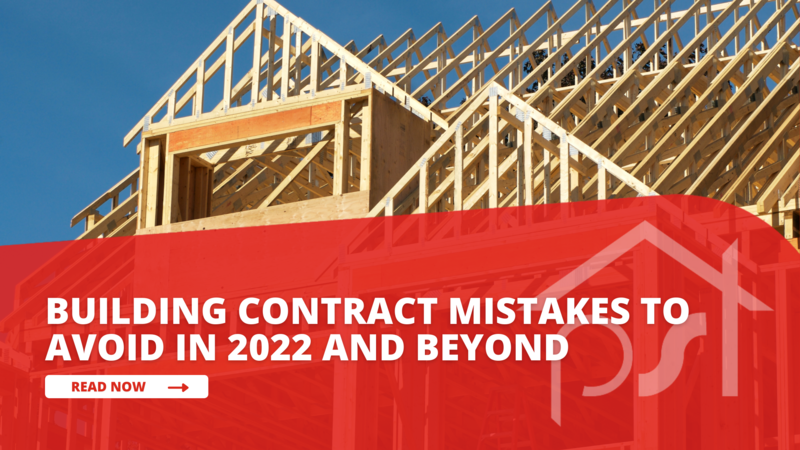
Building Contract Mistakes to Avoid in 2022 and Beyond
With the interest deductibility being removed for most existing rental properties, property investors are increasingly turning their hand to new builds. Unfortunately, the building environment is a bit more complex than usual at the moment (as you've likely read in recent media). So, what better time than now to school up on the ins and outs of new build contracts?
Whether you want to invest in a new build development or renovate an existing property, building is complicated. Thanks to a number of factors, both COVID and non-COVID related, we’re currently in the middle of the perfect storm of high building demand and low supply. Extended lockdowns, isolation periods, supply chain disruptions, and delays have resulted in rising building costs and a backlog of construction projects. On top of this, in 2021, New Zealand issued a record number of building consents - more than what would normally be built in a year without any disruptions. There is record demand for contractors with many booked out for the foreseeable future.
In such a complex building environment, comprehensive knowledge of various processes and contracts is critical. If you’re looking to invest in a new build this year (or any time in the foreseeable future) get yourself a lawyer who specialises in the type of building contract you are entering into. Additionally, here are a few common mistakes people make that you’ll want to avoid:
1. Know the difference between Practical Completion (PC) and Code of Compliance Certificate (CCC)
Practical Completion (PC) and Code of Compliance Certificate (CCC) are two very different things! Not knowing the difference and failing to address it in your contract can leave you in a sticky situation when it comes time to make the final payment.
PC refers to the practical completion of the project - when the builder says the job is done. Many building contracts require final payment on PC. However, lenders, insurers, and prospective tenants will be most concerned with the CCC - when the council says that all aspects of the building consent have been met and the building complies with the requirements of the Building Act.
Rarely, the CCC will be issued before the PC date, but it will usually be issued after. Sometimes there can be quite a delay between the PC date and the issuing of the CCC. This can cause friction between yourself and the builder as banks will often refuse to pay out the final payment until the CCC is issued. Builders will often assure you that they will have the CCC process sorted, however, the default position is that it is the responsibility of the property owner.
To help prevent undue stress for yourself and your builder, have a good discussion with your builder about how things might play out. Work out who is responsible for organising any consents and final compliance. If possible, try and agree to link final payment to the issue of the CCC, rather than PC. Whatever you decide, make sure to get the details in writing and add it to your building contract before you sign it!
2. Understand payment claim timeframes and payment schedules
Whatever you do, make sure you read your contract thoroughly and don’t assume that normal payment terms apply.
When it comes time to make a payment, your builder will send you a payment claim with a 'Form 1' attached. If you’re happy to pay the amount specified in the initial payment claim, you will need to pay it within the agreed-upon timeframe.
The 'Form 1' enables you to dispute the payment claim, by sending a written payment schedule stating the amount you are prepared to pay (which could be nothing). If you wish to dispute the payment claim you need to return a payment schedule within a certain timeframe. If you don’t submit your payment schedule within the agreed timeframe, your builder can take you to Court or refer the matter to adjudication to recover their costs.
Payment and payment schedule timeframes are usually determined in your contract. If you don’t agree on a due date in your contract, the timeframe will be 20 working days after the payment claim is served on you. However, builders will sometimes specify a much shorter timeframe in the contract, such as 7 working days.
It is, therefore, incredibly important that you know exactly what timeframes apply before the time comes so you don’t end up missing your window of opportunity to submit a payment schedule if you don’t wish to pay what is specified.
3. Have a contingency plan for delays & supply issues
In the current construction environment, things are a bit hectic, to say the least, and there are so many unknowns. You’d be hard-pressed to get any builder to guarantee any start and completion dates, not to mention the final costs of building materials that are few and far between. Therefore, it’s important to have a contingency plan in place and to ensure your contract covers you wherever possible.
Here are a couple of things to think about:
-
Late completion penalty: Most contracts at the moment have no penalty for the builder if they are late to complete a project. True, a lot of delays are out of their control, however, it may be reasonable to negotiate a penalty in certain circumstances. If you do wish to impose a penalty on the builder, this will need to be negotiated before the contract is signed.
-
Provisional Sums (PS) and Prime Cost Sums (PC): These sums exist in a contract as placeholders used to estimate certain costs that don’t have exact figures. As mentioned, supply shortages are resulting in increased prices for some materials. This is sometimes resulting in much higher figures than initially anticipated. It’s a good idea to try to reduce or eliminate provisional sums wherever possible. It’s also recommended that you do a comprehensive budget with your lender and factor in potential holding costs.
In the current environment, many builders are demanding to be paid extra despite having no wriggle room in contracts, and if there is no extra payment to be made they are walking away from some projects before completion. While many price increases at the moment are out of builders’ control, it’s important to be aware of what’s happening in the industry and have honest conversations about construction timeframes and possible additional costs. You may also wish to self-procure materials in advance of a project. If you decide to do this, make sure to talk plans through with your lawyer.
4. Align your contract payment process with the lender payment process
Payments, payments, payments! Lenders will have a different payment process to the payment process detailed in your contract. It’s important to understand the difference early and have discussions to align the processes as much as possible so you aren’t caught out. Review your contract carefully with both your lawyer and your lender and align the contract payment process with your lender’s requirements.
5. Check for unfair contractual provisions
Many building contracts are templates that have been (or need to be) heavily modified. Many people sign contracts under pressure and end up with unfair contractual provisions such as:
-
An inability to pull out of the project without paying a significant sum
-
Exclusions: things the contract won’t include (often found in very very fine print)
-
Price escalation clauses that allow the builder to say the price has gone up and they are charging you (without prior agreement or discussion)
Take the time to review your contract carefully and consult a lawyer that specialises in building contracts. They’ll know what to look for and can help you negotiate anything that seems unfair.
6. Steer clear of verbal variations
Sometimes plans change after construction has begun and you'll need to agree on a contract variation with your contractor. Variations can be led by you or the builder. A variation by you could include you deciding to add an extra window. A variation led by the builder could include extra costs associated with unforeseen soil conditions. To ensure everyone sticks to their word, it’s always best to get variation agreements in writing. Before beginning construction, make sure all parties understand how variations should be agreed to and specify the details in the contract.
Again, if you’re looking to invest in a new build development in the current environment, you need to be well-schooled. Take extra care in the preparation of your contract and educate yourself on the various processes and potential pitfalls you may encounter along the way.
_____
DISCLAIMER: The above advice is written by Propertyscouts New Zealand (2020) Limited and is intended as a broad guide for educational purposes only. The advice should not be regarded as legal, financial or real estate advice. In all instances, you should make your own inquiries and seek independent professional advice tailored to your specific circumstances before making any legal, financial or real estate decisions.
_____
